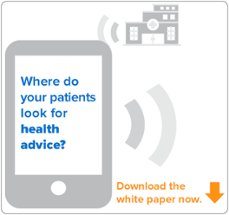
A recent study in Pediatrics suggests that patients (in this case, mothers) are not receiving consistent information and advice from their providers—Maternal Report of Advice Received for Infant Care (Eisenberg et al, August 2015)
“Mothers commonly report receiving either no advice or recommendation inconsistent advice from each of the four sources we studied [doctors, birth hospital nurses, family, and media] regarding immunization, breastfeeding, sleep position, sleep location and pacifier use.”
Before you brush off this data as just an attack on overworked nurses and doctors who are drowning in paperwork and EHR integration, I’d like to offer a different perspective.
Doctors and nurses in private practices and hospitals are increasingly exploring how to improve patient care. The most innovative are looking to technology, the impetus for which is well documented:

- The Centers for Medicare and Medicaid Services (CMS) now requires that hospitals provide patient-specific education resources and communicate digitally with patients to attest to Meaningful Use, receive incentive payments and avoid penalties.
- Giving patients access to two-way communication with their hospitals before, during and after any health event has shown success in improving care and outcomes and in lowering cost growth.
- Practices and hospitals are experiencing patient loss to more accessible and conveniently located healthcare options. Digitally connecting with patients can provide a concierge experience that makes these practices and hospitals the top choice for patient care.
An Attack or an Opportunity?
With all that is being asked—or expected—of hospitals in this changing healthcare environment, the Pediatrics study may feel like an assault on physicians’ and nurses’ livelihoods.
Rather, it’s the perfect opportunity to choose digital tools to enhance their patient-provider relationships.
Digital tools can be both efficient and effective in maintaining and strengthening the relationships that have always been the cornerstone of care. (Related video: Your patients are everywhere.)
- Patients are engaged by consistent “touches” or connections from their hospitals.These help patients become more confident and satisfied with their care.
- Patients forget 80–90% of what they hear during doctors’ appointments. They need reinforcement and reminders for appropriate self-care.
- 93% of patients prefer to communicate with their healthcare providers through email.
The Pediatrics study is telling hospitals that the time is NOW to improve patient confidence, reinforce what is said in the doctor’s office and communicate with patients in a way they are able to understand. Digital health technology helps to achieve these goals.
Case Study: Perfectly Timed Two-Way Communication
How do you know digital tools make a difference in care? Read a case study involving patients of military treatment facilities within the U.S. Department of Defense using patient education systems.
This study found that among patients who received continuous, targeted digital patient education and connections:
- 73% reported taking better care of themselves
- 84% said they take better care of their children
- 80% noted an enhanced hospital connection
- 77% said they feel more confident to manage their healthcare
- 76% said they feel better prepared for appointments
If any of those patients had been included in the Pediatrics study, the results would have been much different.
If your patients don’t think they’re getting sufficient health advice from you, then you must ask yourself, “Where are they looking for health information?” The dreaded Dr. Google, perhaps?
To learn what to look for when choosing the right technology for your hospital, read 5 Tips for Engaging Patients and Improving Patient Care.







